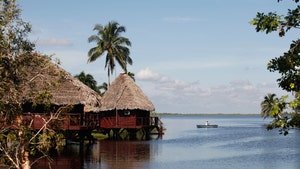Challenges Still Exist for Business and Travel in Cuba
Earlier this year the Obama administration began the process to ease trade and travel restrictions between the United States and Cuba. While touristic travel is still prohibited under the embargo, there are legal travel options.
In order to visit Cuba you must fit into one of the 12 categories for acceptable travel to the island. The U.S. Department of Treasury list includes the following:
- Educational activities
- Religious activities
- Official government business
- Humanitarian projects
- Journalistic activity
- Family visits
- Professional research and meetings
- Athletic competitions
- Public performances, clinics, workshops and exhibitions,
- Travel connected to an authorized export transaction exporting or importing information or “information materials”
- Activities of private foundations or research for educational institutes
- “Support for the Cuban people”
“The penalties are very harsh and it would be a mistake not to follow those categories,” said John Thomas, Assistant Professor for the Chaplin School of Hospitality and Tourism Management at Florida International University. Thomas authored a new study, “Future Hospitality and Tourism Business in Cuba: Opportunities and Obstacles." He says while diplomatic relations are being restored, tourism and establishing businesses in Cuba is a challenge.
“Any business coming to Cuba has to allow the Cuban government to retain 51% of controlling interest, so you can’t just go rent a building and set up shop, you have to get a license from the government and they will be your partner,” said Thomas.
He says controlling interest is one of the reasons why Cuba is not getting a lot of American businesses to commit right away. The other issue is the Cuban government retains the right to hire all employees for a business.
“You can’t go to the street to find people to be employees and you can’t run a wanted ad, you must go through a Cuban agency that provides employees,” said Thomas. “Generally they will give a business a pool of employees to choose from selected by the government employment agency and you have limits on who you can choose as far as benefits and pay. All the working provisions are also negotiated with the employment agency, so it is a third party employment system.”
To make things more complicated, Cuba has two sets of currency; one for the local citizens and the other for foreigners who are visiting or doing business there. If an employee works for a foreign company that person gets paid a salary based upon the foreign currency, which is called the Cuban Peso (CUP) but the employment agency pays the employee in the local currency, which is called Cuban Convertible Peso (CUC).
“The problem is the money the agency gets paid is worth 24 to 26 times as much as what they pay their employees and the government takes the difference between the two types of currency, keeping that as a profit to the government,” said Thomas.
Besides fitting into one of a dozen categories permitted to travel to Cuba; flights, credit cards and Internet is also problematic.
“You can’t just go online and book a JetBlue flight direct to Cuba, you have to take a charter flight so your best option is to go through a tour operator,” said Sara Clemence, News Director for Travel + Leisure.
Clemence says one of the top rated companies to create a customized Cuba trip is Black Tomato. They recently partnered with Travel + Leisure to create a Cuba intinerary. Here are a couple sample itineraries; an eight-night stay for $4,920 per person or five nights starting at $3,550 per person. Some trip highlights include staying in luxury designer penthouses, fincas and working ranches rather than hotels, and visiting Music at Fabrica del Arte; a meeting place where the best of the island's avant-garde arts can be enjoyed under the same roof. Travelers can also meet local artists in their workshops or homes and tour around Trinidad.
If you want to create a travel plan on your own, Airbnb is a good alternative to hotels. There are presently over 2,600 Airbnb homes in Cuba, across nearly 40 different cities and towns. Approximately 50% of all listings are located in Havana, according to Airbnb.
Paying for food, entertainment and gifts could be a struggle; cash is king in Cuba.
“Credit cards are iffy. Yes MasterCard is allowed in Cuba, the U.S. and Cuban governments will allow it but there is no real banking relationship yet except for one small bank located in Florida,” said Thomas.
Cuba is also the perfect destination for those who truly want to go off the grid. Internet service is virtually non-existent or reliable and phones don’t function efficiently.
“The Cuban government wants to censor everything they don’t really want everybody to have Wi-Fi, they want to listen to what everybody is saying,” said Thomas.
While a full removal of the blockade between the U.S. and Cuba will take time, Thomas says he is confident tourists will be able to go to Cuba by next year and travel by sea will be in big demand.
“The first wave of tourists that go to Cuba will be on cruise ships because they carry their own bedrooms, food and facilities,” said Thomas. “They don’t require all the infrastructure and cruise ships can go to the more remote areas of Cuba that are difficult to get to.”




















